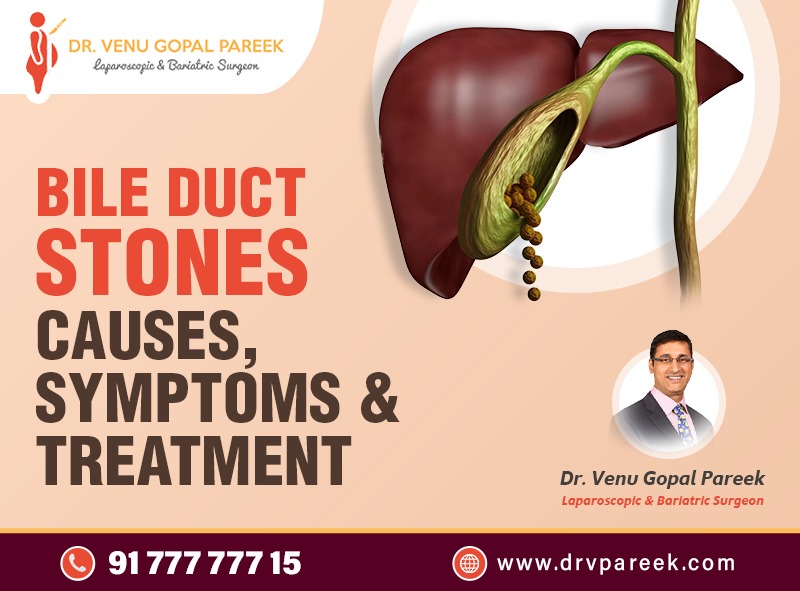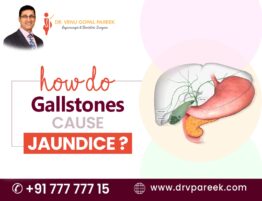
Many people are uncertain about the difference between gallstones and bile duct stones. Before learning about bile duct stones, let’s first gain some understanding of gallstones.
Gallstones are solid masses that form from the buildup of the digestive fluid in the gallbladder. They can range in size from as small as a sand grain to as big as a golf ball. They are generally made up of cholesterol, calcium salts, or bilirubin, a pigment found in bile. Gallstones can cause a range of symptoms such as abdominal pain, vomiting, jaundice etc. However, in some cases, they may cause no symptoms at all.
Coming to bile duct stones; they can develop in two different ways as follows, they are formed as a result of the migration of gallstones from the gallbladder into the bile ducts. The other way is they can develop within the bile ducts. Bile duct stones are also known as choledocholithiasis.
Bile ducts are tube-like structures which connect the gallbladder and liver present in the small intestine. The main function of bile ducts is to carry bile from the liver to the small intestine.
Sometimes, the body is able to get rid of these stones without any issues. However, in certain conditions, they can become stuck in the bile ducts and cause blockages that prevent bile from flowing properly.
Dr. Venugopal Pareek, the best laparoscopic surgeon in Hyderabad, suggests seeking medical attention is very important if you experience symptoms of bile duct stones. This is because untreated blockages can result in complications like infection or inflammation of the bile ducts, and in severe cases, liver damage.
Symptoms of bile duct stones
The symptoms of bile duct stones can vary considering many factors such as the size and location of the stones, but some common symptoms are as follows:
Abdominal pain: Severe pain in the upper right side of the abdomen, which may also spread to the back or chest, can be caused by bile duct stones.
Jaundice: Bile duct stones can obstruct the flow of bile, which causes jaundice, a condition which causes the skin and eyes to turn yellow.
Nausea and vomiting: Bile duct stones can cause nausea and vomiting, particularly after consuming a meal that is high in fat.
Dark urine: Bile duct stones can lead to dark-coloured urine due to the excessive bilirubin in the bloodstream.
Clay-coloured stools: The presence of bile duct stones can restrain the amount of bile that reaches the intestines, resulting in pale or clay-coloured stools.
Fever: Bile duct stones can lead to infection and inflammation, causing a fever.
Itching: Bile duct stones can cause itching of the skin, a result of excess bile in the bloodstream.
In some cases, bile duct stones may go symptomless, but it’s important to seek medical attention if you suspect you have bile duct stones or if you experience any of the above symptoms. An accurate diagnosis and prompt treatment can help prevent serious complications.
Causes of bile duct stones
There are several reasons for causes of bile duct stones, including:
Debris in bile: Bile is a fluid that aids in the breakdown of fats in the small intestine. Bile that is overly concentrated may crystallize and eventually solidify into stones.
Gallstones: Gallstones that are developed in the gallbladder can pass into the bile ducts if they are small and can cause blockages.
Bile duct strictures: This is a condition where the bile ducts become narrow and can cause bile to back up and form stones.
Chronic liver disease: Chronic liver disease, including cirrhosis, can affect the production and flow of bile, potentially resulting in the formation of bile duct stones.
Pancreatitis: Pancreatitis, an inflammatory condition of the pancreas, can lead to alterations in the bile, which may potentially result in the formation of bile duct stones.
Cancer: Certain types of cancer, such as pancreatic or bile duct cancer, can cause changes in the bile that can lead to the formation of bile duct stones.
Primary sclerosing cholangitis, Intestinal parasites, Pancreaticobiliary maljunction, Choledochal cysts and Trauma are some conditions that may also cause bile duct stones.
Treatment for bile duct stones
The treatment for bile duct stones varies from person to person as it relies on many factors, which include the size and location of the stones, the underlying health problems of a patient, and their overall health. However, below are some common treatments for bile duct stones:
Laparoscopic surgery: Laparoscopic surgery is a minimally invasive procedure where a few small incisions are made in the abdomen, and a laparoscope (a tube with a camera head) is used to guide and remove the stones from the bile duct.
Endoscopic retrograde cholangiopancreatography (ERCP): ERCP is a medical procedure that involves the insertion of a thin, flexible endoscope through the mouth, down the throat, and into the bile ducts. This procedure allows the doctor to view the bile ducts, diagnose the gallstones, and then use instruments to remove them.
Cholecystectomy (an open surgical procedure to remove gallstones from the gallbladder or bile duct) and Percutaneous transhepatic cholangioscopy (PTCS) are the other surgical procedures to remove gallstones from the bile duct. The type of surgery will depend on the size and location of the stones, as well as the patient’s overall health.
Shockwave lithotripsy: This is a medical procedure where high-energy shockwaves are used to break gallstones into smaller fragments that can be more easily passed through the bile ducts.
Medical therapy: In some cases, bile duct stones can be treated with medication. Doctors provide certain medicines to help dissolve the stones or to prevent them from forming.
Dr. V Pareek, an expert in bile duct stone treatment in Hyderabad and one of the renowned laparoscopic surgeons for bile duct stones says that it’s important to work closely with any doctor you consult to decide the best treatment plan for your individual needs. The risk of serious complications, such as infection or inflammation of the bile ducts can be prevented by prompt medical attention and also improves one’s overall health.
To consult Dr. V Pareek call +91 91-777-77715 or visit Appointment Booking.







